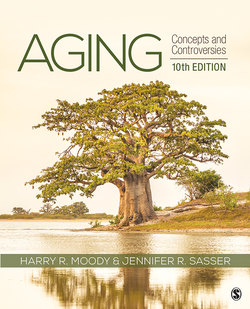Читать книгу Aging - Harry R. Moody - Страница 37
На сайте Литреса книга снята с продажи.
Social Roles
ОглавлениеAnother aspect of self-concept that changes with age has to do with the social roles we occupy. Growing up and growing older, we leave behind earlier roles, such as child, student, employee, parent, and eventually, perhaps, spouse and friend. In the process, whether as an adolescent or a recent retiree, it is natural enough to ask: Who am I? Psychologist Carl Jung described the psychological task of the second half of life as “individuation”—that is, becoming more and more our genuine individual self as opposed to carrying out the social roles required of people in midlife (Chinen, 1989).
Gerontologists have spoken about this late-life transition as a matter of role loss or role discontinuity. In earlier-life transitions, role losses are typically accompanied by new roles that take their place: Ceasing to be a child in one’s family of birth, one grows up and takes on the role of parent. But in old age, some roles, such as those ended by widowhood or retirement, may never be replaced.
From one sociological standpoint, then, old age can be described as a roleless role (Blau, 1981). Once defined in this way, it is a natural step to see aging as a “social problem.” A different perspective is possible, however. Other sociologists look on old age as a period when individuals maintain informal roles that are individually negotiated and perhaps continually redefined and constructed. In other words, the meaning of age, subjectively experienced, would not be decisively determined by the external roles, such as spouse, employee, and parent, that typically shape behavior earlier in the life course. On the contrary, once freed from conventional roles, the development of the self in later life may become a highly individual matter. From a philosophical point of view, old age can actually appear as an unexpected form of “late freedom” (Rosenmayr, 1984).
The importance of the meaning we bring to situations encountered in life has been underscored by several theories of aging. For example, Hans Thomae has developed his cognitive theory of aging based on empirical results of the Bonn Longitudinal Study of Aging (Rudinger & Thomae, 1990). The cognitive theory of aging argues that it is perception of change, rather than actual objective change, that has the most impact on behavior. The same life event—such as retirement—might be perceived by one person as loss and by another as freedom from an oppressive work situation. Cognitive, emotional, and motivational factors shape the way we perceive any event, and adjustment depends on a balance that changes over the life course. Studies of stress and coping in old age reveal individual differences in mastery depending on perception and adaptation.
The subjective experience of meaning is closely related to individual well-being, as Carol Ryff (1989) has argued. She has defined multiple psychological dimensions, including self-acceptance, which may come from reviewing one’s life; positive relations with other people; autonomy and self-determination; mastery of the surrounding environment; beliefs that give purpose to life; and a sense of personal growth and development over the life course. Ryff’s conceptualization gives a new approach to the definition of activity by shifting our attention to the inner dimension of the relationship between ourselves and the world.
But the old theory of disengagement has received some support as well—for example, through the idea of “gerotranscendence,” Lars Tornstam (2005) has suggested that people find the deepest meaning in the last stage of life by overcoming self-centeredness and fear of death in favor of a spiritual focus.
